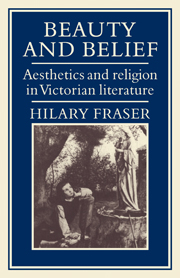Book contents
- Frontmatter
- Contents
- Dedication
- Acknowledgements
- List of abbreviations
- Introduction
- 1 Theology: Keble, Newman, and the Oxford Movement
- 2 Epistemology and perception: Gerard Manley Hopkins
- 3 Criticism: John Ruskin and Matthew Arnold
- 4 Aestheticism: Walter Pater and Oscar Wilde
- Conclusion
- Notes
- Select bibliography
- Index
1 - Theology: Keble, Newman, and the Oxford Movement
Published online by Cambridge University Press: 05 November 2011
- Frontmatter
- Contents
- Dedication
- Acknowledgements
- List of abbreviations
- Introduction
- 1 Theology: Keble, Newman, and the Oxford Movement
- 2 Epistemology and perception: Gerard Manley Hopkins
- 3 Criticism: John Ruskin and Matthew Arnold
- 4 Aestheticism: Walter Pater and Oscar Wilde
- Conclusion
- Notes
- Select bibliography
- Index
Summary
After his conversion to Rome Newman criticised the Church of England for its lack of a proper sense of its own identity:
Nor can it in consequence be said to have any antecedents, or any future; or to live, except in the passing moment. As a thing without a soul, it does not contemplate itself, define its intrinsic constitution, or ascertain its position. It has no traditions; it cannot be said to think; it does not know what it holds, and what it does not; it is not even conscious of its own existence.
Twenty years earlier, however, as an Anglican himself, he had believed that the Anglican Church could be made more self-aware. He conceded that the via media had never existed except on paper and had never been reduced to practice, yet along with others he had determined to reform Anglican ‘practice’, and bring out ‘in a substantive form, a living Church of England in a position proper to hersdf, and founded on distinct principles’, ‘a living Church, made of flesh and blood, with voice, complexion, and motion and action, and a will of its own’. It was a task doomed to failure, for the Church of England was essentially ambiguous in its foundation and flexible in its forms. It deliberately maintained an ill-defined relationship with secular authority and a ‘sort of elasticity’ in its Articles. It was, however, only after many years of vigorous campaigning to give the Church of England a degree of consistency that Newman fully comprehended that it was fundamentally and irredeemably inconsistent.
- Type
- Chapter
- Information
- Beauty and BeliefAesthetics and Religion in Victorian Literature, pp. 7 - 66Publisher: Cambridge University PressPrint publication year: 1986



